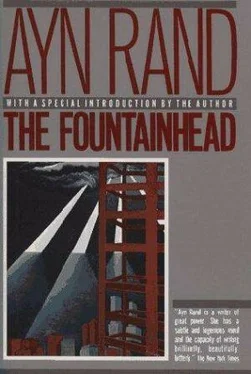"Why?" asked Howard Roark.
No, thought the Dean, no, he hasn't said anything else; it's a perfectly innocent word; he's not threatening me.
"But it's self-evident!" said the Dean.
"Look," said Roark evenly, and pointed at the window. "Can you see the campus and the town? Do you see how many men are walking and living down there? Well, I don't give a damn what any or all of them think about architecture — or about anything else, for that matter. Why should I consider what their grandfathers thought of it?"
"That is our sacred tradition."
"Why?"
"For heaven's sake, can't you stop being so naive about it?"
"But I don't understand. Why do you want me to think that this is great architecture?" He pointed to the picture of the Parthenon.
"That," said the Dean, "is the Parthenon."
"So it is."
"I haven't the time to waste on silly questions."
"All right, then." Roark got up, he took a long ruler from the desk, he walked to the picture. "Shall I tell you what's rotten about it?"
"It's the Parthenon!" said the Dean.
"Yes, God damn it, the Parthenon!"
The ruler struck the glass over the picture.
"Look," said Roark. "The famous flutings on the famous columns — what are they there for? To hide the joints in wood — when columns were made of wood, only these aren't, they're marble. The triglyphs, what are they? Wood. Wooden beams, the way they had to be laid when people began to build wooden shacks. Your Greeks took marble and they made copies of their wooden structures out of it, because others had done it that way. Then your masters of the Renaissance came along and made copies in plaster of copies in marble of copies in wood. Now here we are, making copies in steel and concrete of copies in plaster of copies in marble of copies in wood. Why?"
The Dean sat watching him curiously. Something puzzled him, not in the words, but in Roark's manner of saying them.
"Rules?" said Roark. "Here are my rules: what can be done with one substance must never be done with another. No two materials are alike. No two sites on earth are alike. No two buildings have the same purpose. The purpose, the site, the material determine the shape. Nothing can be reasonable or beautiful unless it's made by one central idea, and the idea sets every detail. A building is alive, like a man. Its integrity is to follow its own truth, its one single theme, and to serve its own single purpose. A man doesn't borrow pieces of his body. A building doesn't borrow hunks of its soul. Its maker gives it the soul and every wall, window and stairway to express it."
"But all the proper forms of expression have been discovered long ago."
"Expression — of what? The Parthenon did not serve the same purpose as its wooden ancestor. An airline terminal does not serve the same purpose as the Parthenon. Every form has its own meaning. Every man creates his meaning and form and goal. Why is it so important — what others have done? Why does it become sacred by the mere fact of not being your own? Why is anyone and everyone right — so long as it's not yourself? Why does the number of those others take the place of truth? Why is truth made a mere matter of arithmetic — and only of addition at that? Why is everything twisted out of all sense to fit everything else? There must be some reason. I don't know. I've never known it. I'd like to understand."
"For heaven's sake," said the Dean. "Sit down ... That's better ... Would you mind very much putting that ruler down? ... Thank you ... Now listen to me. No one has ever denied the importance of modern technique to an architect. We must learn to adapt the beauty of the past to the needs of the present. The voice of the past is the voice of the people. Nothing has ever been invented by one man in architecture. The proper creative process is a slow, gradual, anonymous, collective one, in which each man collaborates with all the others and subordinates himself to the standards of the majority."
"But you see," said Roark quietly, "I have, let's say, sixty years to live. Most of that time will be spent working. I've chosen the work I want to do. If I find no joy in it, then I'm only condemning myself to sixty years of torture. And I can find the joy only if I do my work in the best way possible to me. But the best is a matter of standards — and I set my own standards. I inherit nothing. I stand at the end of no tradition. I may, perhaps, stand at the beginning of one."
"How old are you?" asked the Dean.
"Twenty-two," said Roark.
"Quite excusable," said the Dean; he seemed relieved. "You'll outgrow all that." He smiled. "The old standards have lived for thousands of years and nobody has been able to improve upon them. What are your modernists? A transient mode, exhibitionists trying to attract attention. Have you observed the course of their careers? Can you name one who has achieved any permanent distinction? Look at Henry Cameron. A great man, a leading architect twenty years ago. What is he today? Lucky if he gets — once a year — a garage to remodel. A bum and a drunkard, who ... "
"We won't discuss Henry Cameron."
"Oh? Is he a friend of yours?"
"No. But I've seen his buildings."
"And you found them ... "
"I said we won't discuss Henry Cameron."
"Very well. You must realize that I am allowing you a great deal of ... shall we say, latitude? I am not accustomed to hold a discussion with a student who behaves in your manner. However, I am anxious to forestall, if possible, what appears to be a tragedy, the spectacle of a young man of your obvious mental gifts setting out deliberately to make a mess of his life."
The Dean wondered why he had promised the professor of mathematics to do all he could for this boy. Merely because the professor had said: "This," and pointed to Roark's project, "is a great man." A great man, thought the Dean, or a criminal. The Dean winced. He did not approve of either.
He thought of what he had heard about Roark's past. Roark's father had been a steel puddler somewhere in Ohio and had died long ago. The boy's entrance papers showed no record of nearest relatives. When asked about it, Roark had said indifferently: "I don't think I have any relatives. I may have. I don't know." He had seemed astonished that he should be expected to have any interest in the matter. He had not made or sought a single friend on the campus. He had refused to join a fraternity. He had worked his way through high school and through the three years here at the Institute. He had worked as a common laborer in the building trades since childhood. He had done plastering, plumbing, steel work, anything he could get, going from one small town to another, working his way east, to the great cities. The Dean had seen him, last summer, on his vacation, catching rivets on a skyscraper in construction in Boston; his long body relaxed under greasy overalls, only his eyes intent, and his right arm swinging forward, once in a while, expertly, without effort, to catch the flying ball of fire at the last moment, when it seemed that the hot rivet would miss the bucket and strike him in the face.
"Look here, Roark," said the Dean gently. "You have worked hard for your education. You had only one year left to go. There is something important to consider, particularly for a boy in your position. There's the practical side of an architect's career to think about. An architect is not an end in himself. He is only a small part of a great social whole. Co-operation is the key word to our modern world and to the profession of architecture in particular. Have you thought of your potential clients?"
"Yes," said Roark.
"The Client," said the Dean. "The Client. Think of that above all. He's the one to live in the house you build. Your only purpose is to serve him. You must aspire to give the proper artistic expression to his wishes. Isn't that all one can say on the subject?"
Читать дальше










